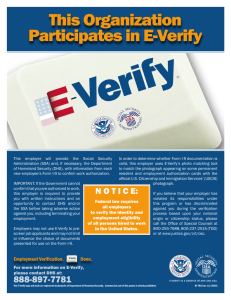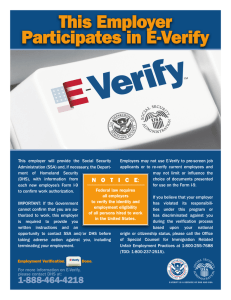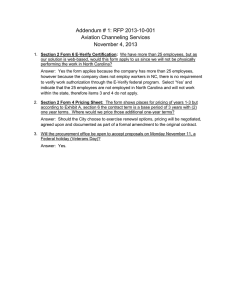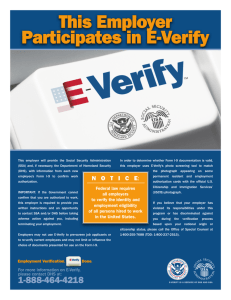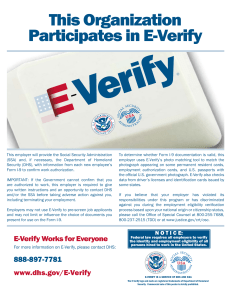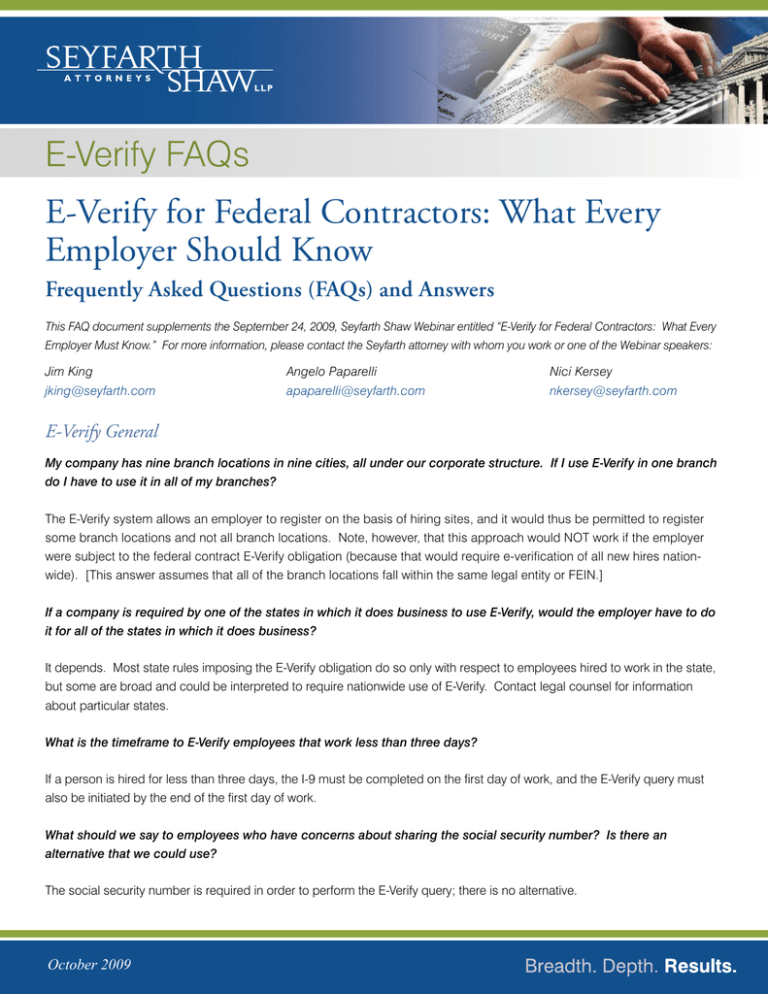
E-Verify FAQs
E-Verify for Federal Contractors: What Every
Employer Should Know
Frequently Asked Questions (FAQs) and Answers
This FAQ document supplements the September 24, 2009, Seyfarth Shaw Webinar entitled “E-Verify for Federal Contractors: What Every
Employer Must Know.” For more information, please contact the Seyfarth attorney with whom you work or one of the Webinar speakers:
Jim King
jking@seyfarth.com
Angelo Paparelli
apaparelli@seyfarth.com
Nici Kersey
nkersey@seyfarth.com
E-Verify General
My company has nine branch locations in nine cities, all under our corporate structure. If I use E-Verify in one branch
do I have to use it in all of my branches?
The E-Verify system allows an employer to register on the basis of hiring sites, and it would thus be permitted to register
some branch locations and not all branch locations. Note, however, that this approach would NOT work if the employer
were subject to the federal contract E-Verify obligation (because that would require e-verification of all new hires nationwide). [This answer assumes that all of the branch locations fall within the same legal entity or FEIN.]
If a company is required by one of the states in which it does business to use E-Verify, would the employer have to do
it for all of the states in which it does business?
It depends. Most state rules imposing the E-Verify obligation do so only with respect to employees hired to work in the state,
but some are broad and could be interpreted to require nationwide use of E-Verify. Contact legal counsel for information
about particular states.
What is the timeframe to E-Verify employees that work less than three days?
If a person is hired for less than three days, the I-9 must be completed on the first day of work, and the E-Verify query must
also be initiated by the end of the first day of work.
What should we say to employees who have concerns about sharing the social security number? Is there an
alternative that we could use?
The social security number is required in order to perform the E-Verify query; there is no alternative.
•
October 2009
Does an employee, hired before 1986, have an option to request that employer not put them on E-Verify?
An employee who has been employed continuously since at least November 6, 1986, is not required to be E-Verified.
Why would an organization enroll in E-Verify as a Corporate Administrator as opposed to enrolling for Employer
Access?
If your organization is made up of multiple legal entities, and you would like for one person to oversee the use of E-Verify for
all of those entities, then you might consider using the Corporate Administrator access method. The Corporate Administrator
can create accounts for each legal entity, can add and remove users, and can view information about E-Verify queries from
each entity.
Federal Contractor Rules
As a temporary staffing service, can I use E-Verify only for my jobs that are federal contracts, such that I would not
have to use it on all new hires but only those that would be working for a federal contract customer?
No. If you are required to use E-Verify under the new federal contractor rule, you typically must use E-Verify for all new hires,
nationwide, for the legal entity that has entered into the contract requiring use of E-Verify. Unless you fall into one of the
exceptions (for educational institutions, federally recognized Indian tribes, state and local governments, or certain sureties),
you cannot limit E-Verification of new hires to those who will perform work under a federal contract.
We are a manufacturer. Are we considered a subcontractor under E-Verify if we provide goods to a prime contractor?
Generally as a subcontractor you are subject to E-Verify only if the prime contractor has included the E-Verify requirement in
the subcontract. The requirement should not be included in the subcontract if the subcontract is only for supplies or goods.
If a federal contractor decides to E-Verify all employees, does the exemption for cleared and nondirect employees still
apply?
If a federal contractor elects to E-Verify all existing employees instead of E-Verifying only those employees “assigned to the
contract,” it still would not be required to E-Verify employees who have the security clearances described in the rule. The
“nondirect” employees would, however, need to be E-Verified.
Does this rule apply to a hospital merely because the hospital has a Medicare contract?
The rule applies only if there is an E-Verify clause in the federal contract (or subcontract) and the contract is one that is a
federal contract procured under the Federal Acquisition Regulation. Thus, for example, a federal research grant is not subject
to E-Verify because it is not a FAR-procured federal contract. Check with legal counsel skilled in federal contracts to be
certain.
E-Verify FAQs
I was under the impression that we were not allowed to check our existing employees only new hires. Is this an
incorrect understanding on my part?
An employer using E-Verify can only E-Verify new hires UNLESS the employer is a federal contractor and the contract
contains the E-Verify obligation (in which case the employer would be required to E-Verify existing employees “assigned to the
contract” in addition to all of its new hires nationwide).
Our contractor status is based on leasing commercial real estate to government tenants. Would the office space
provided through the lease be considered COTS?
Government real estate leases may include certain FAR provisions, so it is theoretically possible that a government agency
leasing a building from a private owner might include the E-Verify clause in the lease, particularly if the owner will provide
services (e.g., maintenance services) as part of the lease. The E-Verify regulations do not directly address this situation, so
you should contact legal counsel with expertise in government contracting and leasing for guidance about specific contracts.
The bottom line is that E-Verify will apply only when the government includes the E-Verify requirement in the solicitation or
contract.
If we chose to E-Verify our entire workforce, do we still have to initiate E-Verification of all existing employees assigned to
the qualifying contract within 90 calendar days of the enrollment date?
No. The Department of Homeland Security must be notified of the option to elect to E-Verify all existing employees; the
employer has 180 days from the date of such notification to complete the E-Verify queries. One could take the position that,
because the deadline is 180 days from the date of notification (rather than the date of registration), it might be possible for an
employer to notify DHS of this choice toward the end of the 90 day period following registration in E-Verify, and then have an
additional 180 days to initiate queries for the existing employees (for a total of up to 270 days post-registration to run existing
employees through the system).
How does an employer notify DHS of its choice to E-Verify all existing employees?
The employer must modify its E-Verify account to indicate the selection. See the September 8, 2009, Supplemental Guide for
Federal Contractors.
When you register as a Federal Contractor, is DHS confirming that an actual contract exists?
We are not aware that the government is verifying the existence of the contract. It would be risky, however, to register as a
federal government contractor and to E-Verify existing employees without such a contract in place. If your organization is
found to have violated the E-Verify rules, the organization could be de-enrolled from the system, resulting in debarment from
federal contracting.
E-Verify FAQs
I set up a client company yesterday, and you can now select federal contractor with the FAR E-Verify clause or federal
contractor without the FAR E-Verify clause. What does this mean?
If an employer registers as a “federal contractor without a contract containing the E-Verify requirement,” the employer will
be treated like a voluntary user: The employer will only be able to run new hires through the system and must update its
registration when it enters into a contract containing the E-Verify clause.
What are “supplies”? Is that synonymous with “goods” vs. services and construction? Can you explain why oil and
agricultural products are exempted?
Supplies would be synonymous with goods. The rule exempts bulk cargo such as oil and agricultural products because
the rule drafters wanted to ensure that the government would have access to such items (and feared that sellers might be
reluctant to sell such goods to the government if those sales would be subject to E-Verify). Thus, because under the FAR
definitions such goods are not considered commercial off-the-shelf goods, it was necessary to create a specific exemption
for them.
What if we are a subcontractor who has employees on their payroll where the contract may not necessarily state that
we have to E-Verify but it is our company policy to E-Verify all of our employees?
In that situation, you are a voluntary user of E-Verify and thus could only use the system on new hires (and not on existing
employees).
Would attorneys involved in creating subcontracts be subject to E-Verify?
Generally, no. Presumably the attorney is not drafting the legal document pursuant to a contract or subcontract containing
the E-Verify clause, and hence the attorney is not subject to E-Verify.
I work for a large office supply company that has contracts with government entities. Am I correct that the office
supplies we provide are considered COTS items? We also sell office furniture that may require us to go in to do
measurements, layouts, etc. Would this still fall under a COTS item? Would a copy and print job function fall under
the COTS item?
The provision of office supplies and furniture would likely qualify for the COTS exemption (assuming that those
goods are also sold in substantial quantity to non-governmental customers). If the measurement and layout services
are normally provided when you sell furniture, then those incidental services would also be covered by the COTS
exemption. It does not appear that copy and print functions would be services incidental to the delivery of a COTS
item, and thus those services would likely not be exempt because those functions appear to be services.
If you chose to E-Verify the entire workforce, can you omit the new hires that were run through E-Verify?
Yes. Once an employee has been E-Verified for an employer, that employer should not E-Verify the employee again. However,
E-Verify FAQs
recent DHS guidance suggests that re-hired employees should be treated like new hires, so there may be situations in which
an employer will run the same person through E-Verify more than once.
If the decision is made to E-Verify all employees, would the employer need to obtain/retain copies of LPR/EAD
documents for the existing employees?
Yes.
If the prime contractor sells COTS items do you need to analyze the subcontractor obligations or does the sub receive
the prime’s COTS exemption?
If the prime contractor sells COTS, then there should be no E-Verify clause in the prime contract, unless the contract
contemplates that non-COTS items or services are also to be provided. In the event that only COTS items are required
under the federal contract, the prime contractor would have nothing to “flow down” to the subcontractor. Thus, there
should be no E-Verify clause in the subcontract.
If the sub provides their employer ID for E-Verify, then do we need to confirm this with DHS?
The prime contractor is not required to confirm the E-Verify registration number of the subcontractor (though the answer might
differ if the prime contractor had a reason to suspect that the information provided by the subcontractor was false).
We have recently entered into a new federal contract after September 8, 2009, but it had no E-Verify language in it.
Therefore, we are still not required to get started with E-Verify for all—correct?
That is correct. If you do not have a federal contract containing the E-Verify clause, then you are not required to use E-Verify
(unless of course you are doing business in a state that mandates use of E-Verify or an Indefinite Delivery/Indefinite Quantity
contract involving services longer than six months is involved and the federal procurement officer seeks to renegotiate the
agreement bilaterally to include the E-Verify clause).
Are financial institutions considered federal contractors under E-Verify since they sell federal savings bonds?
The rule applies only if there is an E-Verify clause in the contract (or subcontract) pursuant to the FAR rules. The comments
to the rule state that financial institutions that sell federal savings bonds will typically not be required to enter into contracts
containing the E-Verify clause.
What if we already ‘registered’ months ago? Do we need to re-register?
If an employer is already registered to use E-Verify on a voluntary basis or in response to a state-level requirement and if the
employer then becomes a federal contractor and receives the contract containing the E-Verify clause, then the employer
should update its E-Verify profile to reflect its status as a federal contractor.
E-Verify FAQs
E-Verify FAQs
I-9 Issues
What if an employee who was hired in 2001 used an unexpired drivers license or U.S. passport at the time he
completed his Form I-9, but now the document is expired. Do we need to go back to the employee to have him
complete a new Form I-9?
If you elect to complete new I-9 forms for all employees who will be run through E-Verify, then yes, this employee should
complete a new I-9. Otherwise, this employee may be able to update his I-9 (rather than completing a new form altogether).
DHS has indicated informally that, although the E-Verify system only accepts unexpired documents, in these situations,
employers may treat expired U.S. passports and driver’s licenses as unexpired, so long as they were unexpired at the time
that they were presented.
How far in advance can an I-9 be completed before a start date?
The I-9 can be completed in advance of the start date but may not be completed before the offer of employment has been
made and accepted.
How should a TNC (Tentative Non-Confirmation) be handled for remote (offsite) employees, since they will not be on
site to sign the form to contest the TNC?
The form should be sent to the employee so that the employee can sign and return the form.
www.seyfarth.com
Attorney Advertising. This newsletter is a periodical publication of Seyfarth Shaw LLP and should not be construed as legal advice or a legal opinion on any specific facts or circumstances. The contents are
intended for general information purposes only, and you are urged to consult a lawyer concerning your own situation and any specific legal questions you may have. Any tax information or written tax advice contained herein (including any attachments) is not intended to be and cannot be used by any taxpayer for the purpose of avoiding tax penalties that may be imposed on the taxpayer. (The foregoing legend has been
affixed pursuant to U.S. Treasury Regulations governing tax practice.) © 2009 Seyfarth Shaw LLP. All rights reserved.

